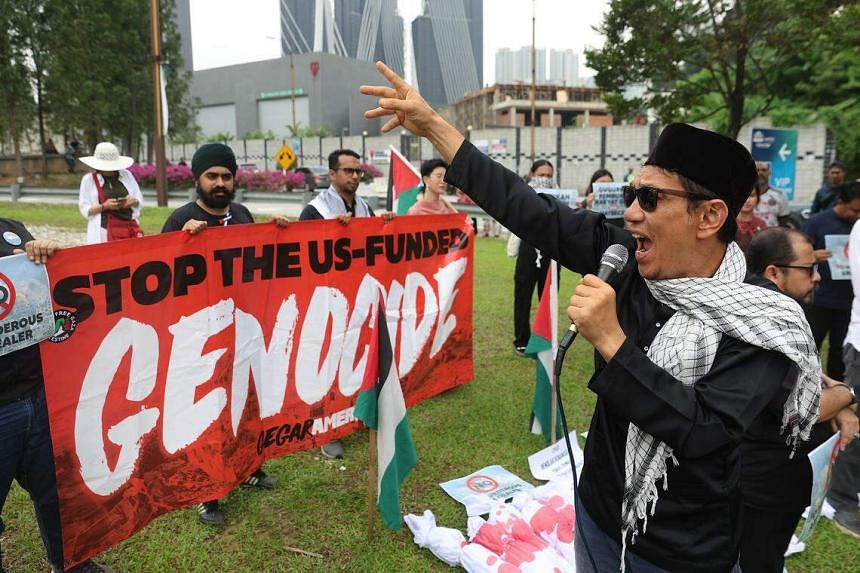KUALA LUMPUR - The Malaysian government has been accused of hypocrisy in its strident pro-Palestinian stance after several defence companies that supplied arms to Israel were allowed to take part in a military exhibition in Kuala Lumpur.
The apparent mixed messages from Malaysia’s leaders underscore the difficulties faced by a government in taking actions consistent with strident condemnation of another state.
Prime Minister Anwar Ibrahim has repeatedly expressed Malaysia’s strong support for Palestine, especially during the Gaza war by condemning Israeli actions in the Palestinian territory as “the height of barbarism”, even as Western companies, including those from the US and the UK, have continued to supply arms to Israel.
Several of those companies, including US aerospace and defence firm Lockheed Martin and British aerospace and weapons firm BAE Systems, are participating in the four-day Defence Services Asia and National Security Asia 2024 exhibition in Kuala Lumpur. They are known suppliers of weapons to Israel but have not commented on the controversy in Malaysia.
Parti Pribumi Bersatu Malaysia’s international bureau chief Saifuddin Abdullah urged the government to ban Lockheed Martin and BAE Systems from participating in and sponsoring the exhibition, citing concerns about the F-35 fighter jet by Lockheed Martin and equipment supplied by BAE being used in attacks on Palestinians.
About a dozen demonstrators on May 7 gathered outside the Malaysia International Trade and Exhibition Centre, where the exhibition is being held.
Palestinian Solidarity Secretariat spokesman Tian Chua said: “You (the government) must be consistent with your foreign policy. You can’t say that you support Palestine, but then contribute to the profits of these companies.”

Former premier Mahathir Mohamad on his X account urged that the companies be expelled from Malaysia, calling their presence at the exhibition “highly offensive to the Palestinian people”.
In response, Malaysian Defence Minister Khaled Nordin said the move showed that Malaysia practises free trade. “Malaysia is a free-trade country, which gives space to all global industry players to market their products and services,” he told reporters on May 7, referring to the firms taking part in the exhibition from May 6 to 9.
“However, we are not setting aside our stance regarding Palestine and Gaza,” he was quoted as saying by The Star daily.
Malaysia has blocked Israeli-owned vessels from using local ports, and Datuk Seri Anwar said on May 7 that no Israeli ships have docked at the main Port Klang in Selangor, following a news report that said an Israeli ship had docked there on April 29.
Still, an analyst said stopping arms suppliers from taking part in local exhibitions could backfire on Malaysia, as the country may in the end face difficulties in buying new weapons or spare parts.
“When it comes to defence industries, there are very few countries around the world that are heavily involved in the defence industry,” said Professor James Chin, who teaches Asian studies at the University of Tasmania.
Many defence companies also use spare parts from all over the world, further complicating planned bans, whereas banning Israeli ships is easier as ships are required to register under one country, he noted.
“Boycotts very often don’t work in practice because the world’s trading system is so interlocked with one another, it is almost impossible to block anything.”

Since the Gaza war began in October 2023, many Malaysian citizens have supported a boycott of products from Western companies that they say are aiding Israel.
But banning or boycotting Israeli-linked goods is a complicated matter, often with domestic repercussions.
In April, KFC began reducing its operations in Malaysia, shuttering about 20 per cent of its restaurants temporarily after months of a persistent pro-Palestine boycott of US-linked businesses triggered by the ongoing war in Gaza.
Malaysian firm QSR Brands, which owns and operates the KFC fast-food franchise locally, suspended operations of some 108 outlets nationwide.
Since the boycott, KFC has shifted its branding strategy, with signs on its menu boards and fliers emphasising it is owned by Johor Corporation, which belongs to the Johor state government, as well as publicising that the local franchise is also owned by the Employees Provident Fund, which has some 16 million members. QSR Brands is controlled by Johor Corporation.
Starbucks and McDonald’s have also been hit after consumers began avoiding them in October.
KL-listed Berjaya Food, which owns 400 Starbucks stores in Malaysia, reported a net loss of RM42.6 million (S$12.2 million) from October to December 2023, with owner Vincent Tan said to be considering taking the company private.
Correction note: In an earlier version of the story, we said that the apparent mixed messages from Malaysia’s leaders underscore the difficulties faced by a government in remaining steadfast in its call for boycotts of a particular country, but there is no government-led boycott currently taking place. We are sorry for the error.


